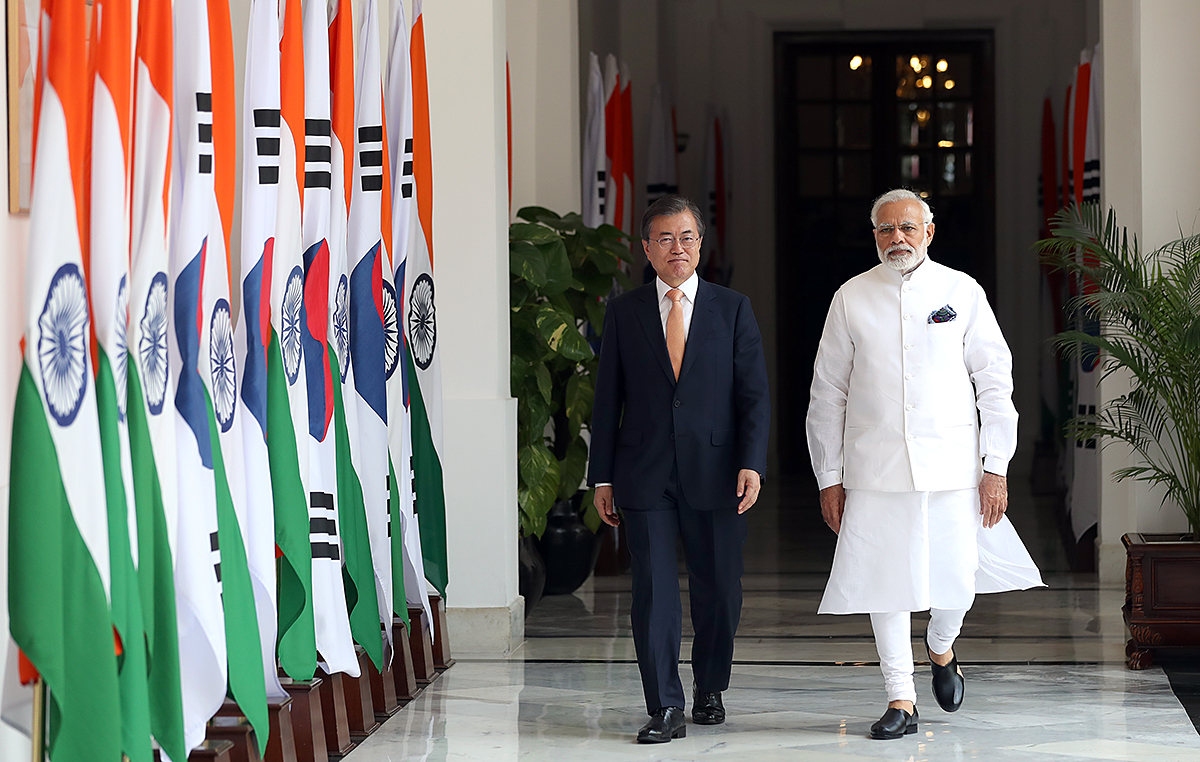이 웹사이트는 제19대 대통령 임기 종료에 따라 대통령기록관이 「대통령기록물 관리에 관한 법률」에 의해 이관받아 서비스하는 대통령기록물입니다. 자료의 열람만 가능하며 수정 · 추가 · 삭제는 불가능합니다.
다만, 「개인정보보호법」에 의하여 개인의 정보를 보호받기 원하시는 분은 관련 내용(요청자, 요청내용, 연락처, 글위치)을 대통령 웹기록물 담당자(044-211-2253)에게 요청해 주시면 신속히 검토하여 조치해 드리겠습니다. 감사합니다.
MEDIA

By Kim Young Shin
President Moon Jae-in, on a state visit to India, held a summit with Indian Prime Minister Narendra Modi at India’s state guesthouse on July 10. The two leaders agreed to further strengthen the “special strategic partnership” that exists between the two countries.
They also officially announced a shared vision that aims to boost bilateral trade between them to USD 50 billion by 2030. Trade between Korea and India currently is worth about USD 20 billion.
“India is a central pillar to Korea’s New Southern Policy and Korea is a major partner of India’s Act East Policy,” said President Moon. “Prime Minister Modi and I agreed that now is the time to make substantial the special strategic partnership that exists between Korea and India, and to raise it to a higher level.”
“We agreed to work toward a ‘3P-plus’ partnership, which will foster cooperation among people, build prosperity and work toward peace, and will generate engines of future economic growth in order to better face the oncoming fourth industrial revolution,” said the president.
The two leaders agreed to upgrade the Korea-India Comprehensive Economic Partnership Agreement (CEPA) in a timely manner to respond to global protectionism and to promote mutual trade.
In particular, in order to cooperate on facing the fourth industrial revolution, the two leaders agreed to establish a Korea-India Future Strategy Group that will provide the grounds for joint projects regarding AI and electric vehicles, and launch an India-Korea Center for Research and Innovation Cooperation that will help to commercialize Korea’s ICT and robotics technologies in Indian markets.
Regarding person-to-person exchanges, the two sides announced that they will lessen inconveniences faced by tourists by simplifying the visa process in order to boost interactions between the two countries. They also said that they plan to regularly visit each other for summit talks.
Moon and Modi both agreed that the complete denuclearization of the Korean Peninsula is critical to the peace and stability of not just Northeast Asia, but of all of international society, too, and expressed hope that the items agreed upon at the Inter-Korean Summit and during the NK-U.S. summit would be implemented as soon as possible.
The Indian prime minister praised President Moon’s role in guiding the recent progress made on the Korean Peninsula. The president thanked India for actively supporting his administrations’ inter-Korea policy and asked for its continued support for the complete denuclearization and the settlement of a lasting peace on the Korean Peninsula.
Following the summit, the two leaders issued a joint press statement and declared the formal adoption of “A Vision for People, Prosperity, Peace and our Future,” which reaffirms the crucial partnership between Seoul and New Delhi.
“I look forward to Prime Minister Modi’s visit to Korea in 2020,” said President Moon. “I hope to continue close communication with him at multilateral summits and online.”
***



